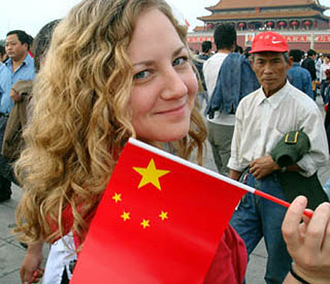In the last half century Asia has ballooned from a few quaint tourist attractions into an immense continent full of opportunities for ambitious young Americans.
In the 60s Asia was Hong Kong, Tokyo and Singapore — the source of colorful paper fans, gold-plated trinkets and exotic women. For most Americans Asia was no more real than pictures in postcards, the names of exotic cocktails.
At the start of the 70s Asia exploded in our consciousness as a threat to democracy and capitalism. The reality of jungle battlefield death tolls forced our minds to grope at the geography of once obscure places like Vietnam, Laos and Cambodia. We struggled to grasp the geopolitical rationale that could justify sending so many American troops and so much materiel to such distant lands.
As that war wound down mid-decade we awakened to a different kind of war. The rising tide of tiny cars and miniature electronics from Japan posed a baffling challenge to the American self image. How could non-white foreigners in a small island nation out-innovate and outproduce the United States of America? The economic assault from Japan deepened the crack growing in the wall that had kept us at a secure remove from the perceived distant world full of second-rate cultures.
For the last quarter of the 20th century the enigmatic Japanese so dominated America’s view of Asia that we rarely bothered to look beyond it to the giant continent beyond. Yet Japan kept itself so tightly sealed off against our giant cars, our cheap rice and our boundless curiosity that we eventually shrugged it off, especially after its economy seemed to implode under the sheer weight of its determined insularity. The Japanese corporations that had been buying up American landmarks and trophies suddenly went into massive withdrawl mode, selling everything and retreating. It was like the unexpected demise of the invading Martians just as they were completing the conquest of earth in War of the Worlds. They had caught the American virus, puffed up like Macy’s balloons, then suffered a deflation so massive that it continues to this day. That anti-climactic end to the Japanese threat reawakened our smug sense that only we have the sacred mulch that keeps societies evergreen.
But just as we entered a new millennium secure in our supremacy at the center of a new era powered by chips and audacious imagination, Americans were hit by the dawning consciousness that our economy was completely dependent on Asia for chips, LCDs, cars, cell phones, loans, brainpower and exploding populations of affluent consumers. Nothing seems as odd to American minds as the concept that in 2011 Chinese will buy nearly twice as many cars as Americans or that GM’s rapid emergence after bankruptcy was powered by the fact that it is on track to sell more cars in China than in the U.S. and Europe combined by 2014.
Unlike the Japanese, the Chinese are eager to buy American products and hire American workers. China recognizes that the biggest limiting factor for growth is the lack of trained, experienced professionals, and has launched national campaigns to encourage foreigners to study and work there. Having learned from Japan’s mistakes, China isn’t interested in turning itself into a big closed factory town but rather in building a dynamic world-class economy that will continue growing long enough to lift the other three-quarters of its 1.35 billion into the upper middle class. We’re talking about at least two more generations of vigorous growth, comparable to the growth that took place in the U.S. between 1900 and 1960 — but on a bigger scale. A similar evolution will be taking place in India, though shifted back by maybe 15 years.
Even now many Americans haven’t gotten used to the idea that the East is now the new West — a land of limitless opportunities. But when they do, they will awaken to a world in which ambitious young Americans can make their fortunes by following the advice of last century’s greatest newspaper editor, Horace Greeley: “Go west, young man!”

